About 1 in 100 people worldwide have celiac disease, an autoimmune disorder triggered by gluten, a protein found in wheat, barley, and rye. (1) (2) In celiac disease, your immune system reacts to gluten by releasing antibodies that can damage your small intestine. This can cause symptoms like abdominal pain, bloating, diarrhea, fatigue, and weight loss. (3) Many people with celiac disease don’t even know they have it because the symptoms can mimic other health conditions. Still, untreated celiac disease can cause serious complications like malnutrition, osteoporosis (weakened bones), and anemia, which is why early detection is important. (4)
Generally, diagnosing celiac disease requires blood tests and an intestine biopsy performed by a healthcare professional. (1) (5) Now, at-home celiac tests offer a convenient initial screening option to help determine if you’re at risk of having the condition. These at-home tests can detect antibodies associated with celiac disease, and some also check for gene variants (changes in the DNA) linked to the condition. (6)
But how do you choose the right at-home celiac test? Our team of experts has done the legwork for you. We’ve evaluated several at-home celiac tests, considering factors that matter to you, like price, ease of use, result time, and availability of follow-up consultations. We’ve narrowed it down to the three best at-home celiac tests currently on the market.
Editor’s choice
With accuracy, affordability, and ease of use, the Everlywell Celiac Disease Screening Test emerges as our Editor’s choice. This test stands out for its thorough analysis of key celiac antibodies, with quick results, clear reporting, dedicated clinical support, rigorous laboratory standards, and at one of the lowest prices in our selection. It’s an accessible option for anyone looking to assess their celiac disease risk.
Medical disclaimer: This article is intended for educational and informational purposes only. It is not intended as a substitute for medical advice. For health advice, contact a licensed healthcare provider. While at-home celiac tests are a great starting point, always consult with your healthcare provider to interpret the results and determine your next steps.
Our picks for the best at-home celiac tests
- Best affordable: Everlywell Celiac Disease Screening Test
- Best for genetic testing: RxHomeTest Celiac Genetic Test
- Best comprehensive: Genovate DNA Celiac Disease Test
Compare at-home celiac tests
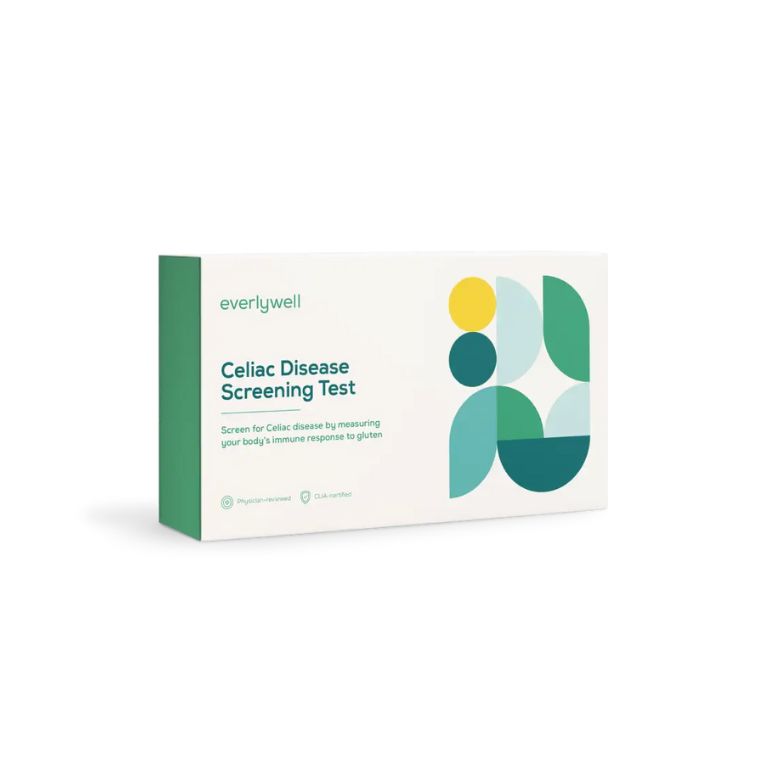
|
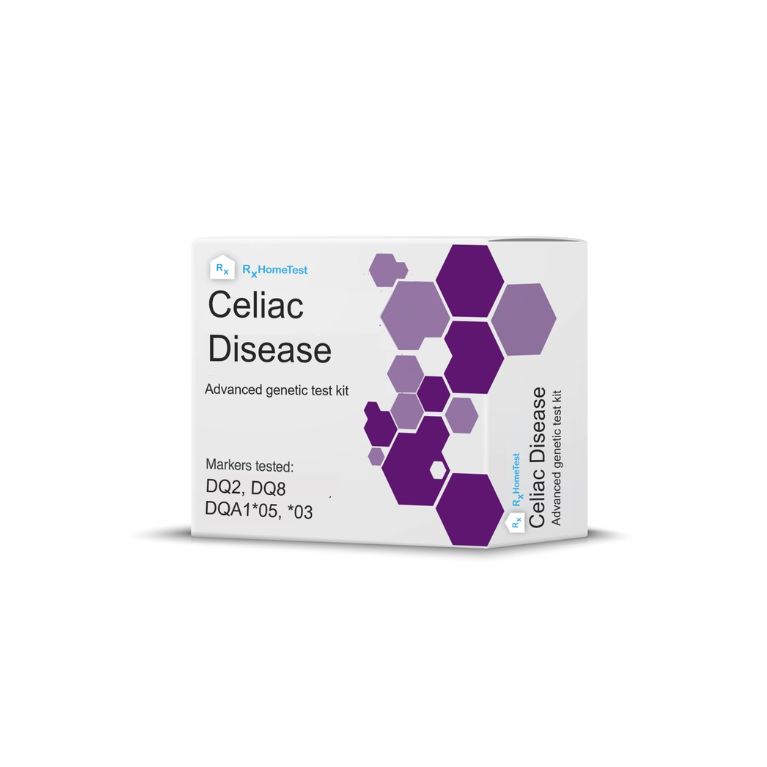
|
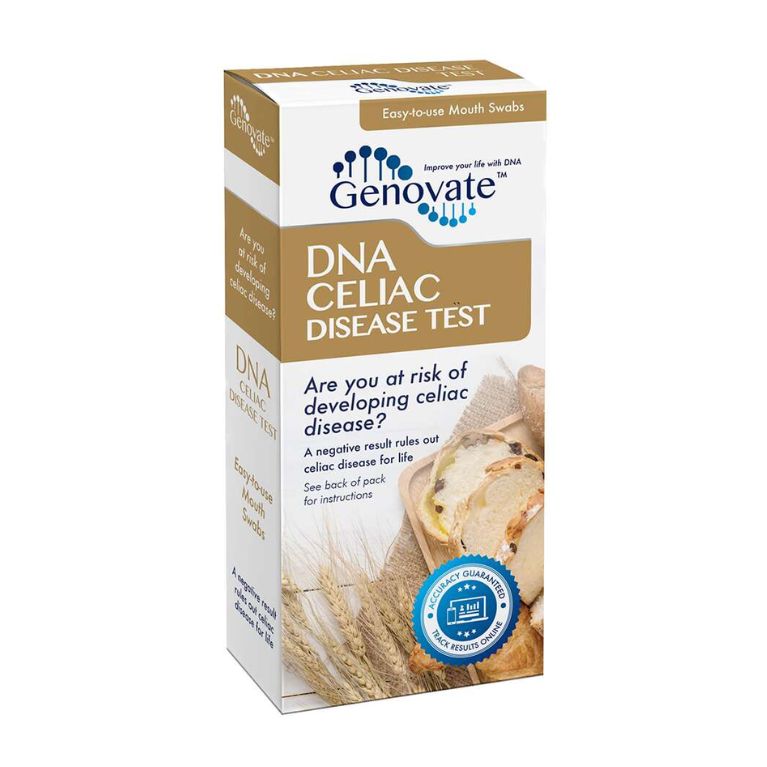
|
|
| Everlywell Celiac Disease Screening Test | RxHomeTest Celiac Genetic Test | Genovate DNA Celiac Disease Test | |
| Rating | |||
| Price | $119 | $149.99 | $249 |
| Results in | 5-7 business days | 5-7 business days | 4-6 weeks or more |
| Collection method | Finger prick | Cheek swab | Cheek swab |
| Follow-up | Yes | No | No |
Best affordable at-home celiac test: Everlywell Celiac Disease Screening Test
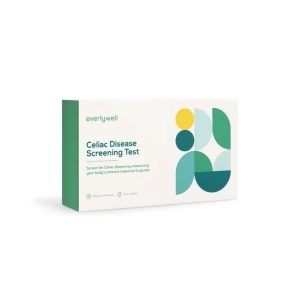

Key product features
What you should know
With the Everlywell Celiac Disease Screening Test, you get a budget-friendly at-home celiac test and comprehensive screening. Here’s what sets it apart:
- This test measures three key antibodies to help detect celiac disease: Tissue transglutaminase immunoglobulin A (tTG-IgA), total immunoglobulin A (IgA), and deamidated gliadin peptide immunoglobulin G (DGP-IgG).
- At $119, including free shipping, this test provides an affordable way to help you understand your risk for celiac disease compared to traditional testing methods.
- This test is ideal for individuals experiencing uncomfortable symptoms when eating gluten-containing foods (wheat, barley, rye, triticale).
- The test may not be suitable if you:
- Have already been diagnosed with celiac disease
- Are not currently eating a gluten-containing diet or haven’t consumed gluten in the last three months
- Are taking medications like corticosteroids or immunosuppressants, which could affect test results
- This test is not available in New York.
Why we like Everlywell Celiac Disease Screening Test as best affordable
Could that post-pizza bloat be more than just overeating? How about that stubborn stomach pain whenever you eat pasta? Knowing your antibody levels is an important part of celiac disease self-care. The Everlywell Celiac Disease Screening Test might just be your first step towards understanding this mystery. This at-home celiac disease test kit offers a convenient way to check for potential celiac disease markers, all at an affordable price of $119.
What sets this test apart is its thorough approach to screening. It’s not just looking for one possible telltale sign; it checks for the following three key antibodies to help detect celiac disease:
Tissue transglutaminase immunoglobulin A (tTG-IgA): In celiac disease, anti-tissue transglutaminase antibodies increase when your body reacts to gluten. Healthcare providers use the tTG-IgA test to detect these antibodies in your blood. (7) If the results are positive, there’s a high chance you have celiac disease.
Total immunoglobulin A (Total IgA): The total IgA test doesn’t directly test for celiac disease. Instead, it measures the overall amount of IgA antibodies in your body. This is important because if your IgA levels are generally low, you might not produce enough tTG-IgA antibodies, even if you have celiac disease, which could lead to false-negative results. Checking total IgA helps ensure that the tTG-IgA test is accurate by identifying any IgA deficiency that could affect the results. (8) (9)
Deamidated Gliadin Peptide Immunoglobulin G (DGP-IgG): This antibody is measured if total IgA levels are low, serving as a backup to prevent false negatives. (9) Not every Everlywell Celiac Disease Screening Test user will receive results for the DGP-IgG test since it’s only performed when needed.
What we appreciate about the Everlywell Celiac Disease Screening Test is its comprehensive approach to initial screening. The test uses a two-step process, first measuring tTG-IgA and total IgA, then checking DGP-IgG if total IgA is low. (8) (9) This method helps ensure more accurate results by accounting for potential IgA deficiencies.
Another standout feature is Everlywell’s detailed report. It includes a breakdown of each marker tested and what the results may mean. Plus, board-certified physicians review all test results, adding an extra layer of reliability. The company also offers educational resources and telehealth services, which can be helpful if you’re having trouble accessing specialist care.
We also liked that Everlywell supports users by having a patient care team reach out if test results show an indeterminate or increased risk of celiac disease. They can answer your questions and help prepare you for discussing your results with your healthcare provider, who can then review your results, symptoms, and medical history to decide if further testing is needed.
You can trust the quality of this test. Everlywell partners with Clinical Laboratory Improvement Amendments (CLIA)-certified laboratories that adhere to the highest industry standards and undergo regular inspections.
The test kit includes free two-way shipping and all necessary materials for sample collection: lancets, a blood collection card, bandages, gauze, and clear instructions. While the finger prick method may be uncomfortable for some people, it offers a convenient alternative to traditional blood draws.
Results are typically available within five to seven business days, which is reasonably quick for a comprehensive screening test. However, this is an initial screening test only and cannot diagnose celiac disease. Regardless of your results, it is important to talk to a qualified healthcare provider for proper interpretation and follow-up testing.
Keep in mind that for reliable results, you need to be consuming gluten regularly for at least three months before taking the test. If you’ve been on a gluten-free diet recently, the test may not be accurate. Also, certain medications like corticosteroids or immunosuppressants may affect the results. This test isn’t available in New York, and while you may be able to buy it with your health savings account (HSA) or flexible spending account (FSA) funds, it’s unlikely to be covered by insurance.
What our experts say
“The accepted diagnostic algorithm for celiac disease is blood testing followed by a tissue biopsy of the small intestine,” said Dr. Aneesha Dhargalkar, MD. “Regarding the first step, the Everlywell Celiac Disease Screening Test is exactly what you want. It tests for the right antibodies in the right order, and the two-step process of checking DGP-IgG if IgA levels are low is what is medically recommended. This kit’s easy-to-follow instructions, clinical support, and affordability make it a top choice for at-home celiac disease testing.”
“I appreciate the simple process with comprehensive at-home testing provided by Everlywell, especially that a board-certified physician reviews each test result,” adds Dr. Simran Malhotra, a triple board-certified physician in internal medicine, hospice and palliative care, and lifestyle medicine.
What customers are saying
Many users found the Everlywell Celiac Disease Screening Test user-friendly and informative. Customers appreciated the clear instructions and the ease of use.
“This was easy to use at home. The instructions were simple and easy to follow. They called me with the result and the next steps since my test was positive for concern for celiac. I then had confirmation testing at the local hospital, which was also positive, so I feel like the test was accurate. The associated app is also user-friendly.”
”Amazon Customer,” Amazon
One verified Amazon customer, “Jaspernut,” shared their positive experience: “I’ve been wondering for years if I was celiac but never have taken the steps to get medically tested. Until I tried out this kit, it was super easy to use. The instructions were clear and easy to follow. I had to stab my finger twice to get the right amount of blood required, but this is to be expected if you’ve never done a finger poke like me. There were three pokers provided so that I could safely try again. Feedback was quick and responsive through emails and texts. Turnaround time for results was super fast and friendly. If you’re looking for answers, this is a fast, easy way to do it!”
However, some users noted limitations. Leonie, another verified Amazon customer, pointed out: “This will give you a ‘yes or no’ answer, but keep in mind it doesn’t give you any specific values on the test.”
Similar to other at-home blood tests, some customers reported difficulties with sample collection. Several users mentioned challenges in producing enough blood for the sample, a common issue with finger-prick tests.
Overall, customers appreciated the convenience and quick test results, but some desired more detailed information from their results. Some users highlighted the accuracy of the test when confirmed by follow-up hospital testing, as a plus.
Specs
| Price | $119 |
| Markers tested | Tissue transglutaminase immunoglobulin A (tTG-IgA)Total immunoglobulin A (IgA) – used as a control testDeamidated gliadin peptide immunoglobulin G (DGP-IgG) – performed only when necessary |
| Accepts HSA/FSA | Yes |
| Clinical support | Yes |
| Results time | 5-7 business days |
| Sample type | Blood through finger prick |
| Shipping | Free two-way |
Best at-home celiac test for genetic testing: RxHomeTest Celiac Genetic Test
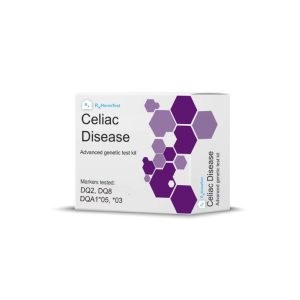

Key product features
What you should know
A standout option for those seeking genetic information, the RxHomeTest Celiac Genetic Test earns our recommendation as the best at-home celiac test for genetic testing. Here’s why it excels in genetic screening:
- This test checks for high-risk (DQ2, DQ8), medium-risk (DQA105), and low-risk (DQA103) gene variants associated with celiac disease.
- At $149.99, including free two-way shipping, this test provides an affordable way to look into your genetic risk for celiac disease without requiring a doctor’s visit or lab appointment.
- Ideal for a wide range of people, from those with a family history of celiac disease to people experiencing unexplained symptoms, this test can be taken regardless of your current diet.
- The non-invasive cheek swab collection method makes this test accessible and comfortable for users of all ages.
- This test is available across the US (excluding New York and New Jersey) and Canada, and results are available within 5 to 7 business days after the lab receives your sample.
Why we like RxHomeTest Celiac Genetic Test as best for genetic testing
The RxHomeTest Celiac Genetic Test won our recommendation for best at-home celiac test for genetic testing for several reasons. It’s an affordable at-home genetic test that examines your DNA to determine your predisposition to celiac disease.
Certain gene variations called HLA-DQ2 and HLA-DQ8 are linked to celiac disease risk. The RxHomeTest Celiac Genetic Test checks for these genes, which are important in determining if someone is at risk of having celiac disease. About 95% of people with celiac disease have one or both of these genes. (12) (14) Research shows that finding HLA-DQ2 can reliably diagnose celiac disease in people of all ages and genders. (11) (16)
Why are these genes so important? If you have a first-degree relative with celiac disease, especially a sibling, your risk of developing the condition is significantly higher. (15) This is because you’re more likely to share these HLA genotypes and other factors that can trigger the condition. This genetic test allows you to examine your genetic makeup and understand your risk, even before you have symptoms.
The RxHomeTest goes beyond just checking DQ2 and DQ8. It also includes medium-risk (DQA105) and low-risk (DQA103) gene variants, providing a more comprehensive view of your genetic risk for celiac disease.
What really stands out about this test is its simplicity and convenience. After ordering online, you’ll receive your at-home test kit within three to five business days. The kit includes everything you need, including cheek swabs, instructions, and a prepaid return envelope. There is no need for blood samples or finger pricks; just a quick cheek swab is all it takes. This makes it a great option if you’re uncomfortable about blood tests or testing children.
We appreciate that this test can be done regardless of your current diet. Unlike antibody tests that require you to consume gluten, this genetic test can be performed any time, as genetic markers don’t change based on gluten consumption. This is particularly helpful if you’ve already eliminated gluten from your diet but want to understand your genetic risk. This flexibility makes the test a valuable tool in celiac disease self-care.
The quick turnaround time is another key advantage. Once the lab receives your sample, you can expect results within five to seven business days. These results are delivered through a secure, easy-to-understand report that includes your genotype for celiac disease and a risk score. You’ll get a simple “yes” or “no” result for each gene marker tested. From these results, a risk score is calculated, placing you in a risk category, such as very high, high, low, or extremely low for developing celiac disease. With this information, you can have an informed discussion with your healthcare provider about your risk and next steps.
Another standout feature that gives us confidence in the RxHomeTest Celiac Genetic Test is the use of CLIA-certified labs. These labs are regulated by the Centers for Medicare and Medicaid Services (CMS) and are subject to regular quality checks. (17) This means the test meets quality standards.
However, RxHomeTest has some drawbacks. It doesn’t offer one-on-one clinical support to help interpret results, which can be challenging given the complexity of genetic information. This is why it’s important to talk to a healthcare provider who can help you understand your genetic risk in relation to your overall health, family history, and symptoms and guide you on whether more tests are needed.
Additionally, the test isn’t available in New York or New Jersey due to state regulations, which could be inconvenient for residents there. The $149.99 price tag is higher than some antibody-based tests, but this test is still more affordable than many other at-home celiac genetic tests on the market. While the test offers many advantages, it’s important to remember that genetic testing has its limitations. A positive result doesn’t necessarily mean you have or will develop celiac disease.
Despite these limitations, the RxHomeTest Celiac Genetic Test offers a convenient way to understand your genetic risk, especially for those with a family history or symptoms of celiac disease. Remember that it’s a screening tool for basic information, not a definitive diagnosis.
What our experts say
“An optional first step in your celiac disease journey can be genetic testing,” said Dr. Dhargalkar. “The haplotypes HLA-DQ2 and HLA-DQ8 are present in almost all patients with celiac disease. Testing for these haplotypes has a negative predictive value of over 99%. This means you do not have celiac disease if you are negative for these tests. The RxHome Test Celiac Genetic Test kit tests for these two genetic markers and a few additional less sensitive and specific haplotypes. This, along with convenient testing methodology (cheek swab collection), non-restrictive diet, and fast results, makes it my top choice for at-home celiac genetic testing.”
“I appreciate that this is a non-invasive test and does not require consuming gluten in your diet, which makes it more appealing, especially for those who have already eliminated gluten from their diet or have severe abdominal symptoms while consuming gluten,” adds Dr. Malhotra. “Regardless of what the test shows, I always recommend discussing the results with your medical team. Especially since there is no clinical support to help you interpret the results of this test.”
What customers are saying
Customers who have used the RxHomeTest Celiac Genetic Test generally report positive experiences. Here are a couple of reviews:
Nikki D. gave the test a 5-star review on Sitejabber, praising its ease of use and comprehensive results:
“I ordered the celiac genetic test and am very happy with my results. The test came quickly, was easy to administer, and even had links to videos to help explain how to take the sample. My results were easy to read and included charts and a genetic risk calculator to help me understand my report better.”
Nikki D., Sitejabber customer
“Overall, I am very happy with RxHomeTest, they continue. “They had great communication throughout the whole process, updating me on my order every step of the way. It was also a very affordable option, and I plan to use it again in the future for other testing. I have already recommended them to my family.”
Karen S. also left a 5-star review on Sitejabber, emphasizing the convenience of the at-home testing process:
“I had a good experience with their customer service. The best part was how simple it was to test from home without all the hassle. I wish they offered more tests.”
Most reviews for this test are positive, but few are available, so you might not get a full picture of all user experiences. Remember, individual results and experiences can vary.
Specs
| Price | $149.99 |
| Markers tested | DQ2, DQ8 (high-risk genes)DQA105 (medium-risk gene) DQA103 (low-risk gene) |
| Accepts HSA/FSA | Not mentioned |
| Clinical support | No |
| Results time | 5-7 business days |
| Sample type | Cheek swab |
| Shipping | Free two-way (within the US) |
Best comprehensive at-home celiac test: Genovate Celiac Disease DNA Test
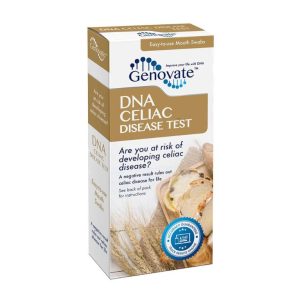

Key product features
What you should know
With its detailed genetic analysis and thorough risk assessment, the Genovate Celiac Disease DNA Test stands out as the best comprehensive at-home celiac test. Here’s why we think it’s the top choice:
- This test looks at certain gene variations linked to celiac disease, focusing on HLA-DQA1 and HLA-DQB1. It also assesses your risk based on DQ2 and DQ8 proteins and other related genetic markers.
- At $249, it’s one of the most comprehensive celiac disease genetic tests on the market but also one of the most expensive.
- The test uses a cheek swab for DNA collection, which many find more comfortable than a blood test.
- Results are reliable even if you’re on a gluten-free diet, unlike antibody tests requiring gluten consumption.
- This test is ideal for those who want to understand their genetic risk for celiac disease, especially those with a family history of the condition or persistent symptoms despite negative antibody tests.
Why we like Genovate Celiac Disease DNA Test as best comprehensive
Understanding your genetic risk for celiac disease is an important first step in celiac disease self-care. The Genovate Celiac Disease DNA Test offers a convenient way to start this process from home.
While gluten is what triggers celiac disease, your genetic makeup largely determines whether you’re susceptible to the condition in the first place. Most people with celiac disease have a specific gene pattern called HLA-DQ2 (DQA10501-DQB10201), while a few have HLA-DQ8 (DQA10301-DQB10302) or parts of the DQ2 pattern (usually the DQB10201). (11) (12) (13)
The Genovate Celiac Disease DNA Test checks multiple variants in the HLA-DQA1 and HLA-DQB1 genes to assess your risk based on your genetic profile. This can help you and your healthcare provider decide if more tests or dietary changes are needed.
We like the test’s versatility. Unlike antibody tests that require you to consume gluten before testing, this genetic test can give reliable results regardless of your current diet. This makes it a great choice if you’re already on a gluten-free diet and want to understand your celiac disease risk without having to add gluten back into your diet.
According to the company, a negative result from this genetic test can rule out celiac disease. This is because almost all people with celiac disease have at least one of the genetic risk alleles tested. (11)
As health experts, we appreciate that Genovate is dedicated to quality, with certifications from top organizations in laboratory testing. These include the Association for the Advancement of Blood & Biotherapies (AABB), the College of American Pathologists (CAP), CLIA, and ISO17025, an international standard for testing and calibration laboratories. Based on Genovate’s policy, they run each test twice to ensure accuracy.
The test is easy to use—just a simple cheek swab you can do at home. There is no age restriction, making it great for both kids and adults, which is especially helpful for families with a history of celiac disease. Plus, you can check your test status online 24/7, which is super convenient.
Genovate’s test is more expensive than others. However, it provides detailed results, including any specific gene variants, if any, and a personalized risk assessment for developing celiac disease. This can make it a worthwhile investment for many.
The Genovate Celiac Disease DNA Test kit has everything you need for easy at-home testing. You’ll find mouth swabs for collecting your DNA sample, a specimen envelope, and a prepaid return envelope to send it back. The kit also includes detailed instructions to guide you through the process. Once you receive your kit, remember to activate it online. You’ll receive an email when your results are ready.
You don’t need a prescription from a healthcare provider to order the Genovate Celiac Disease DNA test. If you change your mind after ordering the test, you can request a refund within 30 days of purchase. Just keep in mind that refunds are not allowed once they receive your sample or start testing.
One significant drawback of this test is its longer processing time compared to other at-home genetic tests. Results can take four to six weeks or more to arrive, which may be frustrating for those seeking quicker answers about their celiac disease risk.
The company does not offer one-on-one clinical support to help you understand your test results. Still, reviewing your results with a qualified healthcare professional is important. They can interpret your genetic risk, review your symptoms and family history, and guide you on the next steps. The Genovate Celiac Disease DNA Test can be an important step in your celiac disease self-care journey. Still, at-home celiac tests are just one part of managing your health.
What our experts say
“The Genovate Celiac Disease DNA Test is another genetic testing kit that evaluates specific genetic patterns within the HLA-DQ2 and HLA-DQ8 haplotypes, the two genetic markers that, if negative, mean that you most likely do not have celiac disease. What I like about this test is that you do not need to consume gluten to obtain an accurate result. This is important as many consumers may be limiting this substance in their diet due to debilitating symptoms such as abdominal pain, bloating, and diarrhea. This, along with the convenient collection method of cheek swabbing, makes the Genovate Celiac Disease DNA Test a great at-home genetic test for celiac disease.” states Dr. Dhargalkar.
“This one is more expensive, without clinical support, and has a much longer processing time, similar to the genetic testing ordered by your genetic counselor or medical team,” notes Dr. Malhotra. “So, in this case, it may make sense to discuss your testing options with your medical team first to see if your insurance provider would cover a similar test.
Specs
| Price | $249 |
| Markers tested | HLA-DQA1 and HLA-DQB1 gene variants (including DQ2 and DQ8) |
| Accepts HSA/FSA | Not mentioned |
| Clinical support | No |
| Results time | 4-6 weeks or more |
| Sample type | Cheek swab |
| Shipping | Free two-way |
Our at-home testing methodology
At-home celiac disease tests can help you understand your risk for the condition or how your body reacts to gluten. We carefully review each test before recommending it, evaluating factors like accuracy, ease of use, and clarity of results.
For genetic tests, we check how many gene variants are analyzed and how well the risk is explained. For antibody tests, we look at which antibodies are tested and how sensitive the test is. We also consider how you collect the sample, how quickly you get results, and what support is available to help you understand them.
We want to help you choose the best test, whether you’re exploring your genetic risk or checking for an active health condition. Read our at-home testing methodology for more information on our testing process.
Testing criteria
Accuracy and reliability—40%
Accurate test results are the most important element of at-home testing kits, as they form the basis for the user’s health decisions. Whether you’re exploring your genetic background, tracking fertility cycles, or identifying food sensitivities, the integrity of the data provided by these tests is crucial. Reliable results help users confidently make informed decisions for personal health management or discussions with their healthcare provider.
Here’s what we look for:
- Measurement precision
- Consistency
- Environmental influence
- Sample integrity
- Lab standards
Ease of use and accessibility—30%
The ease of use and accessibility of at-home testing kits determine how effectively individuals can utilize these products. A testing kit may offer the most advanced technology and accurate results, but its benefits are significantly diminished if it is not user-friendly. Ensuring that these kits are accessible and easy to use empowers a broad range of users, including those who may not have prior experience with medical testing or technology. This enhances the likelihood of correct usage, accurate sample collection, and reliable results, ultimately improving the overall experience and satisfaction. We evaluate:
- Instruction clarity
- Sample collection process
- Online platform usability
- Support resources
- Accessibility features
Value—20%
Evaluating the value of at-home testing kits is critical, encompassing the initial purchase price, long-term financial implications, and overall cost-effectiveness. A high-value kit delivers reliable results without imposing excessive costs over time, so users can receive meaningful health benefits for their investment.
We evaluate:
- Cost of the kit
- Insurance coverage
- Long-term cost analysis
- Warranty
Customer experience—10%
A positive customer experience helps users feel supported, informed, and satisfied at every stage of their interaction with the kit. This category considers multiple touchpoints, including customer service, delivery and packaging, user feedback, and return policies. By prioritizing customer experience, we aim to recommend products that not only meet technical and performance standards but also provide a seamless and supportive user experience.
Our factors in this rating include:
- Customer service
- Delivery and packaging
- User feedback and reviews
- Return policy
How to choose an at-home celiac test
Choosing the right at-home celiac test can feel overwhelming with the various options available. Here are some key questions to help guide your decision:
Am I looking for genetic risk or active celiac disease?
There are two main types of at-home celiac tests: genetic and antibody tests. Genetic tests check for genes associated with celiac disease risk, while antibody tests look for signs of an active celiac disease condition. When choosing, consider your specific needs and health concerns.
What’s my current diet?
A genetic test might be best if you’re already on a gluten-free diet, as it doesn’t require gluten consumption. Antibody tests, however, typically need you to eat gluten for accurate results.
How quickly do I need results?
Test result turnaround times can vary. Some tests provide results within a few days, while others might take several weeks. Think about your timeline and choose accordingly.
What kind of sample am I comfortable providing?
Like other at-home food sensitivity tests, at-home celiac tests usually require either a blood sample (via finger prick) or a cheek swab. Cheek swab tests are generally convenient, less invasive, and painless compared to finger prick tests. They may also work well if you’re testing children. Consider which method you’re more comfortable with.
Is the testing lab reputable?
Look for tests that use CLIA-certified labs. This certification ensures the lab meets high-quality standards, increasing the reliability of your results. It’s even better if a board-certified physician oversees the results. This means a qualified expert checks your results before you see them.
What support is offered after testing?
Some at-home celiac testing companies provide detailed explanations of your results and access to a clinical team for follow-up questions. If you want help interpreting your results, look for a test that offers this support. Still, it’s always best to review your results with your doctor or a qualified healthcare professional to fully understand what they mean for your health.
What’s my budget?
Prices for at-home celiac tests can vary widely. Some might be eligible for HSA or FSA coverage. Determine your budget and look for a test that offers the best value within your price range.
How to test for celiac disease
To test for celiac disease, several methods are used, often starting with blood tests and followed by additional procedures. Here’s a breakdown of the process:
Antibody tests
Blood tests are the main way to diagnose celiac disease. They check for specific antibodies in your body’s blood if it sees gluten as a threat. These antibodies can show if there’s an immune response typical of celiac disease. Testing for these antibodies is important because elevated levels can suggest the presence of the disease. (7) (8) (9)
Genetic tests
Genetic testing checks for certain genes linked to celiac disease, like HLA-DQ2 and HLA-DQ8. Having these genes means you have a higher chance of developing celiac disease, but it doesn’t confirm you have the health condition. If these genes are absent, the disease is less likely. This test helps understand your risk by looking at your genetic makeup, offering more information for diagnosing celiac disease. (11) (12) (13)
Endoscopy and biopsy
If blood tests suggest celiac disease, an endoscopy is usually done. A healthcare provider uses a flexible tube with a camera to examine the small intestine and take small tissue samples. The biopsy checks for damage to the villi, which are tiny finger-like projections in the intestine that are affected by celiac disease. (18) (19) “It’s worth noting that this is the Gold Standard for testing,” adds Dr. Malhotra.
Celiac disease treatment
The main treatment for celiac disease is following a strict gluten-free diet. This means avoiding all foods that contain wheat, rye, and barley. (20) This allows the small intestine to heal and symptoms to improve. A healthcare provider or a registered dietitian can help plan a healthy gluten-free diet and teach you how to read food labels and identify hidden sources of gluten. (21)
In some cases, your healthcare provider might recommend multivitamins and mineral supplements to help correct any nutritional deficiencies caused by the disease. (20) It’s important to stick to the gluten-free diet even if you’re feeling better, as consuming gluten can cause damage to your intestines even if you don’t have obvious symptoms. There’s no cure for celiac disease, but with proper management through a gluten-free diet, most people can live healthy, symptom-free lives.
Are at-home celiac tests accurate?
At-home celiac tests can be accurate, but it’s important to understand no test is 100% accurate. Sometimes, tests can give incorrect results due to errors in the test itself or because the results are interpreted incorrectly. This is true for at-home celiac tests, too. Additionally, some direct-to-consumer tests—such as at-home tests—are reviewed by the FDA, while others are not. (22)
Both genetic and antibody at-home celiac tests can be helpful, but their accuracy depends on factors like lab processing, proper sample collections, how well instructions are followed, and how the results are interpreted.
At-home tests can be a good starting point, but they’re not a replacement for an official diagnosis from a healthcare provider. False positives and false negatives can happen. That’s why it’s always best to share your at-home test results with a qualified healthcare professional. They can interpret the results correctly and decide if more testing is needed to confirm a celiac disease diagnosis.
FAQs
What is a celiac test?
A celiac test checks how your body reacts to gluten, a protein found in wheat, barley, and rye. (1) (2) There are two main types: blood tests that look for certain antibodies and genetic tests that check for genes linked to celiac disease. A celiac test can be a first step in understanding whether your symptoms are due to celiac disease or gluten intolerance (also called non-celiac gluten sensitivity). At-home celiac tests can’t diagnose celiac disease or gluten intolerance directly, but they can help you and your healthcare provider investigate your symptoms.
Who should get tested for celiac disease?
You should think about getting tested for celiac disease if you have symptoms like frequent stomach pain, diarrhea, or unexplained weight loss. (3) This applies to children older than three and adults. Testing is also a good idea if you have a close family member (like a parent, sibling, or child) with celiac disease, as it tends to run in families. People with other autoimmune conditions, such as type 1 diabetes or thyroid disease, should consider testing too. (23) This is because these conditions share some common genetic and environmental triggers with celiac disease. So, if you have an autoimmune disease like type 1 diabetes, you might be at an increased risk of developing celiac disease. (24)
What is the best at-home celiac test?
The best at-home celiac test depends on your specific needs and situation. Generally, good tests come from reputable companies that use CLIA-certified labs. Look for tests that check for either celiac-related antibodies, such as the EverlyWell Celiac Disease Screening Test, or genetic markers associated with celiac disease, such as the Genovate Celiac Disease DNA Test. The best tests provide clear, easy-to-understand results and offer some form of support to help you interpret them. However, no at-home test can diagnose celiac disease on its own. You can use an at-home test as a starting point and then discuss the results with your healthcare provider.
Our experts
Aneesha Dhargalkar, MD
Dr. Aneesha Dhargalkar is a freelance medical writer and board-certified emergency medicine physician currently practicing in West Chester, PA. She graduated cum laude from John Hopkins University in 2002 and from Jefferson Medical College in 2006. Dr. Dhargalkar is the director of her hospital’s wellness provider program and sits on the executive board of both the Chester County Suicide Prevention Task Force and the Unionville Chadds Ford School District Education Foundation.
Simran Malhotra MD., DipABLM, CHWC
Dr. Simran Malhotra is a triple board-certified physician in internal medicine, hospice and palliative care, and lifestyle medicine, and a certified health and wellness coach. She is currently practicing part-time as an inpatient palliative care physician at MedStar Health. She completed the T.Colin Campbell Plant-based nutrition certification in 2019, the CHEF culinary coaching certification in 2020, and the WellCoaches health and wellness coaching certification in 2022.
Heather Morsellino
Heather Morsellino is a fact-checker and healthcare writer with over four years of experience working in healthcare. She has worked as a pharmacy technician, emergency room medical scribe, an anesthesia technician, and is finishing up her ADN within the next year.

Maggie Aime, MSN, RN
Fortune Recommends Longevity Writer
About Author
Maggie Aime, MSN, RN, is a health, wellness, and medical personal finance writer. With over 25 years of experience in healthcare, she draws on her rich background in nursing, case management, revenue management, medical coding, and utilization review nurse consultant to create educational and empowering content.
Maggie is passionate about teaching people about disease prevention, healthy living, and how to navigate the U.S. healthcare system. She is actively involved in professional nursing and journalism organizations, and founded The Write RN to share her knowledge and expertise.
When she’s not writing her next article, Maggie is likely savoring sunrise views at the beach, immersed in DIY projects, or playing the piano.
